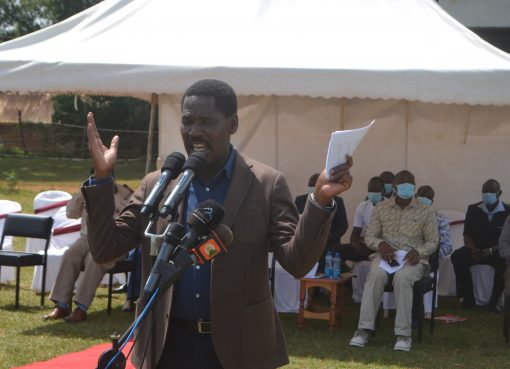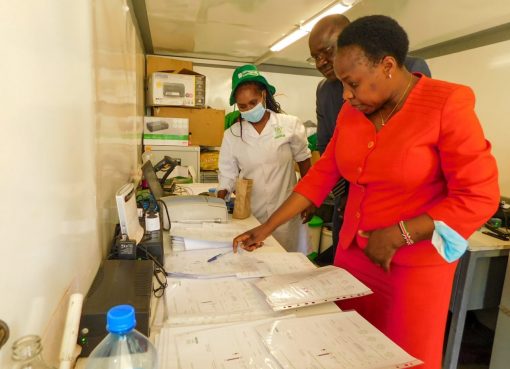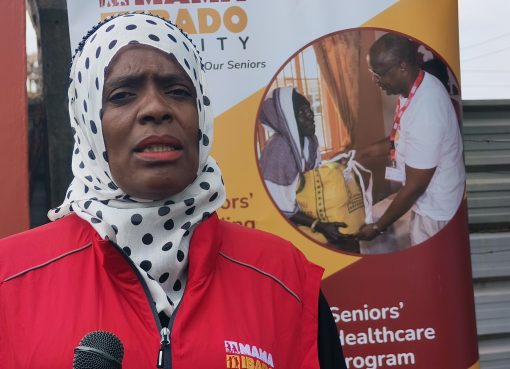On January 31 every year, Mr James Manyara visits the Sachangwan Mausoleum where 77 victims of an oil tanker fire tragedy are buried in a mass grave.
He vividly remembers events of that fateful Saturday morning a decade ago when a fuel tanker burst into flames two hours after it overturned at Sachangwan trading centre along the Nakuru-Eldoret Highway as determined men, hapless women and innocent children scrambled for the spilling fuel.
Such visits which afford him an opportunity to lay flowers on the mass grave of his former relatives and village mates who perished in the deadly inferno evoke poignant memories. The disaster claimed over 150 lives.
While marking yet another anniversary on Thursday, January 31 this year, Manyara gave a tear-jerking account of how survivors of the tragedy that left many dead and scores of others scarred for life were grappling with depression and shortage of gainful employment.
“This agonizing episode happened 10 years ago but it is as if it happened yesterday. I always recollect the piercing screams for help, confusion and death of colleagues who only hours earlier had either been tending their farms or going on with their hawking businesses,” Mr Manyara says.
Manyara, 41, now ekes out a living as a tractor driver. According to him there is consensus that those affected by the incident need counselling, medical and financial help.
All those interviewed want political leaders to desist from turning the tragedy into a campaign item where they always promise residents that if they get elected, they will fight to ensure that those affected are compensated.
The plaque at the grave site reads “The Sachangwan oil tanker fire tragedy directly affected some 347 victims. Some 130 victims whose names are engraved on this plaque were burnt beyond recognition, and 78 of them were laid to rest in this mass grave. Another 69 victims died in hospital and were buried by their relatives. The rest of the victims were badly maimed by the fire and were hospitalized in various hospitals and later discharged.”
Manyara was undertaking his normal routine of tilling his family’s farm at Kibunja when he heard about the overturned tanker that was freely discharging petrol fuel.
“I said why not rush and help myself too to free fuel. Luckily when the fire started, I was on a motorbike with my younger cousin heading to the scene. That is how I survived the horrific incident. My three brothers and my nephew were not so lucky as they were already in the middle of the commotion scooping the high octane liquid,” he narrates.
Manyara maintains that an entire generation that could have made immense contributions to the County’s social, political and economic development was ruined by the tragedy.
“This mausoleum is now the richest place in Molo Sub-County. It hosts doctors, engineers, teachers, lawyers and many other professionals who would have shaped the destiny of this country. Many of them were well known to me and were very promising and optimistic individuals. Their deaths ominously loom in my mind,” he says.
“Every January, I set aside time to come here and lay flowers in memory of my departed colleagues. It is an appalling thing to remember,” he says, pain engraved on his face.
Ms Charity Kareithi a fruits and vegetable at the Sachangwan trading centre was also at the mausoleum with her 25 year old son David Mburu.
“My son has for about 10 years been suffering from trauma, which saw him drop out of school. He is incapable of engaging in meaningful work.
“This weird behaviour began soon after we were informed that his elder sister Janet Muruiki had died in the petrol tanker flames in Sachangwan. I stay with him all the time and do most things for him,” Ms Kareithi said, recalling the incident that robbed her of her eldest daughter.
Barely four Kilometers away we encounter Christopher Langat, 38, hawking sugar cane along the busy Nakuru-Eldoret-Kisumu highway.
Then, he and his friends were undertaking menial jobs at a nearby construction site when people broke into a tumult and started a scamper towards the highway, saying, a petrol tanker had been involved in an accident and they were going to fetch fuel.
“I was still engrossed in searching for a container when I saw a huge ball of fire. I broke into a confused run but tripped and landed in a trench. I was engulfed all over by fire. It was hell. It changed many lives,” he reminisces
He spent several weeks in hospital. He is still traumatized when he sees a big fire.
Ms Margaret Oraba lost her husband in the tragedy. He was burnt beyond recognition and was interred alongside others in a mass grave. Her son also perished in the tragedy.
Since her husband was the family’s sole breadwinner, Ms Oraba and her children have been constrained to sell sugar cane on the highway with other youth and women, not too far away from the mass grave.
“Many Kenyans may have moved on after the Sachangwan oil tanker tragedy, but affected families are still traumatized. Cases of depression, stroke and paralysis have increased significantly in the area. The elderly are the major casualties. Lack of psycho- socio support left survivors in a precarious state” says Ms Oraba.
Among the worst hit areas by the tragedy are villages and trading centres along the highway with most homesteads in Kibunja and Sachangwan having lost more than one relative.
In one homestead, 70-year-old Gabriel Mwangi, who suffered a stroke after losing two children, is wasting away. Neighbours and relatives say Mwangi who can hardly communicate, was traumatized by the death of his two children.
“He was in a state of shock for days after the incident and later suffered stroke and since then he appears confused,” his son, Richard Ngunjiri, who cares for him says.
For the family of Elena Kavisi the tragedy was the immediate cause of their mother’s death. David Kibango, 44 year claims that his mother slid into depression and passed on in 2011 after his sister Beatrice Esoi perished in the tragedy.
“She used to wonder aloud why the fire consumed her daughter and wished she was the one who died,” he says.
At the home of Naomi Waithera who lost four children in the inferno, only prayers and counseling have helped her cope with the traumatic loss of her four children namely Paul Njenga (28), Esther Wanjiru (20), Rose Muthoni (17), and James Mwangi (13).
Relatives and survivors of the tragedy have since started a support group where the encourage one another. The group has about 200 members who meet monthly.
“Initially the number of those attending the meetings used to be high but the enthusiasm by participants has dwindled over the years,” says Manyara. “We are appealing for support especially from the Government for counseling services”.
He says the names of those who perished in the inferno and engraved on the mausoleum should act as a reminder to motorists and villagers along the busy highway to avoid scenes of oil tanker accidents.
He remains hopeful that time, which is said to be a healer, will heal their shattered hearts and give them closure that remains ever so elusive.
By Jane Ngugi




